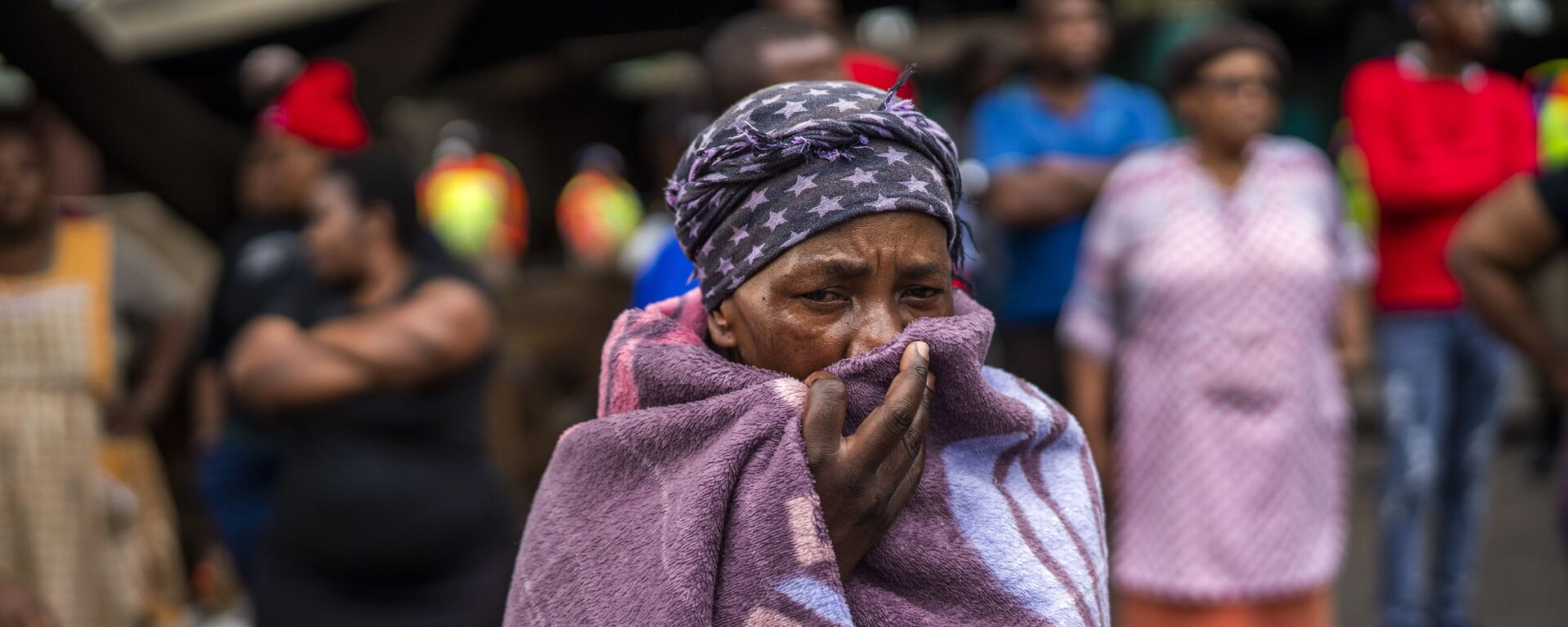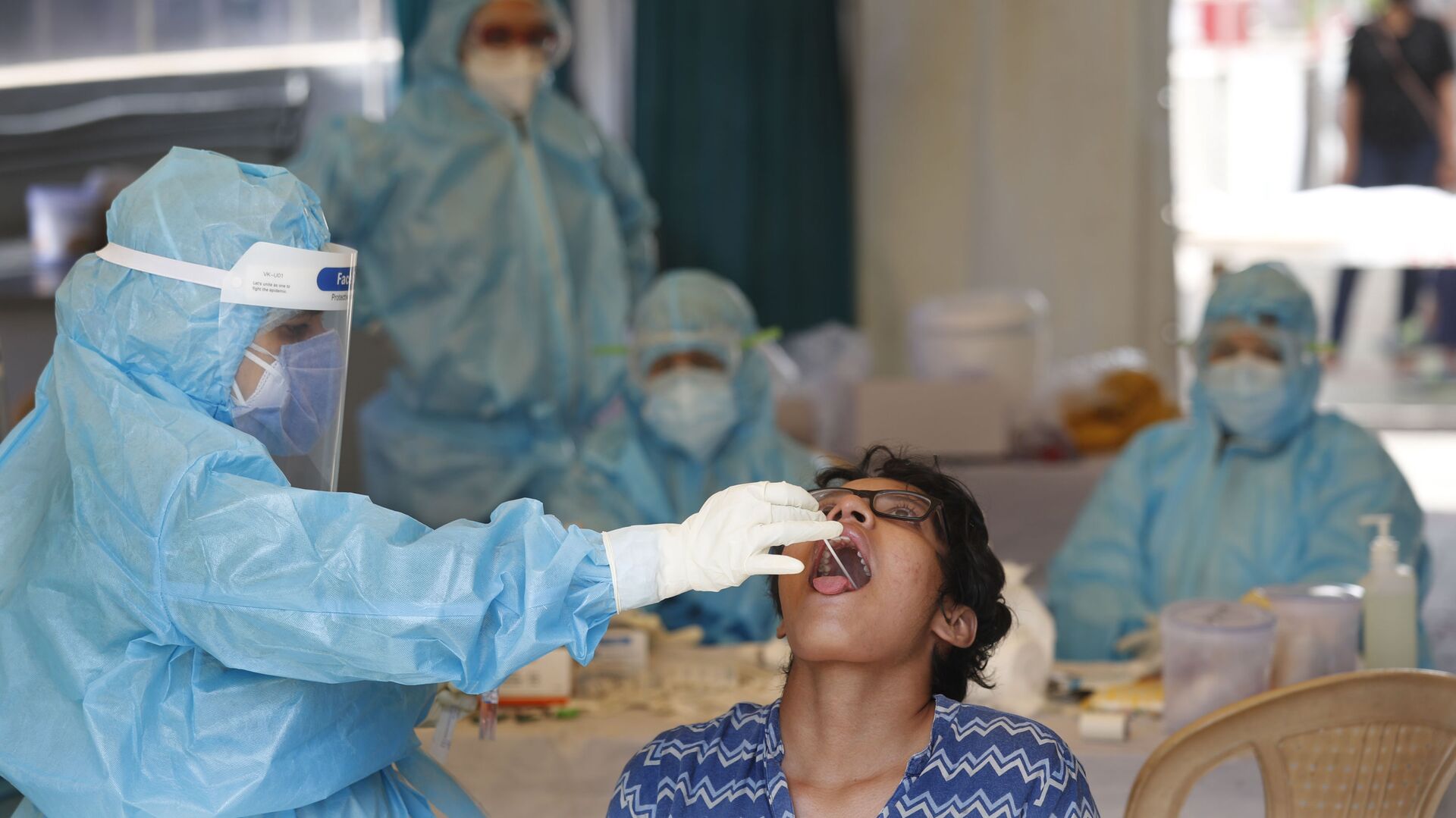https://sputnikglobe.com/20211126/india-new-south-african-covid-19-variant-triggers-panic-govt-announces-rigorous-screening--tests-1091038528.html
India: New South African COVID-19 Variant Triggers Panic, Gov't Announces Rigorous Screening & Tests
India: New South African COVID-19 Variant Triggers Panic, Gov't Announces Rigorous Screening & Tests
Sputnik International
On Thursday, South African scientists announced that 22 positive cases of variant B.1.1.529 have been recorded in the country after genomic sequencing of the... 26.11.2021, Sputnik International
2021-11-26T13:45+0000
2021-11-26T13:45+0000
2022-07-19T10:40+0000
sars coronavirus
coronavirus
covid-19
https://cdn1.img.sputnikglobe.com/img/107961/51/1079615197_0:357:3005:2047_1920x0_80_0_0_175d71cd1a736cd284590bfe550847a7.jpg
The newly detected strain of coronavirus in South Africa has become a cause of concern in India. According to media reports, no case of the new COVID-19 variant which goes by the scientific number B.1.1.529 has been reported in the country so far. Yet, the Indian government on Thursday directed state authorities to rigorously screen and test travellers coming from or transiting through South Africa, Botswana, and Hong Kong - where the variant has been confirmed. In a notification to all states and Union Territories, Indian Health Secretary Rajesh Bhushan said that the country's National Centre for Disease Control (NCDC) has informed the government that "multiple cases of COVID-19 variant B.1.1529 have been reported in Botswana (3 cases), South Africa (6 cases), and Hong Kong (1 case)".As per the latest guidelines, all Indian states will now have to send samples from COVID-positive travellers to designated labs of the Indian SARS-CoV-2 Genomics Sequencing Consortium (INSACOG), which is responsible for tracking and monitoring the emergence and transmission of variants of concern and variants of interest in the country. The World Health Organisation (WHO) has so far recognised four variants of concerns (VoCs) and out of them Beta (Pango lineage B.1.351), was first detected in South Africa in May 2020. The other three VoCs, Alpha (B.1.1.7), Delta (B.1.617.2), and Gamma (P.1) were first detected in the United Kingdom, India, and Brazil in September 2020, October 2020, and November 2020 respectively. Dr. Pinto also said that scientists are concerned about some mutations potentially rendering this strain capable of evading the immunity offered by the present vaccines (immune escape) since the strain is so different from the present strains against which the current vaccines were developed. Meanwhile, other than the possibility of evading the immunity acquired by the vaccines, some Indian doctors and health experts are worried that this variant can potentially cause breakthrough COVID-19 cases. Some experts have maintained that as India has relaxed visa restrictions for international travel, the detection of this highly aggressive COVID-19 variant could have serious implications. Reportedly, this new variant has as many as 32 mutations in the spike protein, which forms the core part of the virus that most vaccines target to stimulate a protective immune response amongst vaccine recipients. Doctors and health experts also told Sputnik that as mutations become inevitable, long-term preparations and strategic planning to live with this COVID-19 pandemic are essential. The WHO is expected to conduct a technical meeting on Friday in order to decide if it should be designated a variant of "interest" or of "concern".
https://sputnikglobe.com/20211126/eu-to-propose-banning-flights-from-southern-african-region-amid-concerns-over-new-covid-variant-1091033604.html
https://sputnikglobe.com/20211125/who-reportedly-calls-meeting-on-friday-over-covid-strain-found-in-south-africa-botswana-1091024947.html
Sputnik International
feedback@sputniknews.com
+74956456601
MIA „Rossiya Segodnya“
2021
Sushmita Panda
https://cdn1.img.sputnikglobe.com/img/07e5/05/12/1082926186_0:0:2048:2048_100x100_80_0_0_4474d0d7e27a36878eb8727832be74b4.jpg
Sushmita Panda
https://cdn1.img.sputnikglobe.com/img/07e5/05/12/1082926186_0:0:2048:2048_100x100_80_0_0_4474d0d7e27a36878eb8727832be74b4.jpg
News
en_EN
Sputnik International
feedback@sputniknews.com
+74956456601
MIA „Rossiya Segodnya“
Sputnik International
feedback@sputniknews.com
+74956456601
MIA „Rossiya Segodnya“
Sushmita Panda
https://cdn1.img.sputnikglobe.com/img/07e5/05/12/1082926186_0:0:2048:2048_100x100_80_0_0_4474d0d7e27a36878eb8727832be74b4.jpg
sars coronavirus, coronavirus, covid-19
sars coronavirus, coronavirus, covid-19
India: New South African COVID-19 Variant Triggers Panic, Gov't Announces Rigorous Screening & Tests
13:45 GMT 26.11.2021 (Updated: 10:40 GMT 19.07.2022) On Thursday, South African scientists announced that 22 positive cases of variant B.1.1.529 have been recorded in the country after genomic sequencing of the COVID-19 virus. Scientists across the globe are concerned as the new variant has at least 10 mutations. Meanwhile, the World Health Organisation (WHO) is closely monitoring the strain.
The newly detected strain of coronavirus in South Africa has become a cause of concern in India. According to media reports, no case of the new COVID-19 variant which goes by the scientific number B.1.1.529 has been reported in the country so far.
Yet, the Indian government on Thursday directed state authorities to rigorously screen and test travellers coming from or transiting through South Africa, Botswana, and Hong Kong - where the variant has been confirmed.
In a notification to all states and Union Territories, Indian Health Secretary Rajesh Bhushan said that the country's National Centre for Disease Control (NCDC) has informed the government that "multiple cases of COVID-19 variant B.1.1529 have been reported in Botswana (3 cases), South Africa (6 cases), and Hong Kong (1 case)".
As per the latest guidelines, all Indian states will now have to send samples from COVID-positive travellers to designated labs of the Indian SARS-CoV-2 Genomics Sequencing Consortium (INSACOG), which is responsible for tracking and monitoring the emergence and transmission of variants of concern and variants of interest in the country.

26 November 2021, 07:47 GMT
The World Health Organisation (WHO) has so far recognised four
variants of concerns (VoCs) and out of them Beta (Pango lineage B.1.351), was first detected in South Africa in May 2020.
The other three VoCs, Alpha (B.1.1.7), Delta (B.1.617.2), and Gamma (P.1) were first detected in the United Kingdom, India, and Brazil in September 2020, October 2020, and November 2020 respectively.
"B.1.1.529, the new variant reported from the Gauteng Province in South Africa, is a heavily mutated form of the virus. It has 10 mutations that first binds to human cells – the receptor-binding domain", Dr Lancelot Pinto, Consultant Pulmonologist, P.D Hinduja Hospital & MRC, Mahim West, Mumbai, told Sputnik.
"The velocity with which it appears to be becoming the dominant strain in South Africa surpasses what was seen with earlier strains, suggesting this to be a highly transmissible strain", he added.
Dr. Pinto also said that scientists are concerned about some mutations potentially rendering this strain capable of evading the immunity offered by the present vaccines (immune escape) since the strain is so different from the present strains against which the current vaccines were developed.
"India needs to consider having a strict quarantine period for individuals entering from South Africa."
"We need to closely follow data as it evolves like the efficacy of present vaccines against this strain, whether individuals who have received booster doses are better-protected and whether we need to brace ourselves for another wave if this variant proves itself to be more virulent," Dr. Pinto added.
Meanwhile, other than the possibility of evading the immunity acquired by the vaccines, some Indian doctors and health experts are worried that this variant can potentially cause breakthrough COVID-19 cases.
"So far we know that this virus is mutating at frequent intervals and the reason behind the intermittent surge in a number of cases," Dr. Akshay Budhraja, Pulmonologist, Aakash Healthcare, Delhi, told Sputnik.
"This new strain can be a reason for a new spike in the number of cases and an increase in fatalities, not just in India but for the entire globe."
"This is a potential threat to even those people who are COVID recovered or fully vaccinated," he added.
Some experts have maintained that as India has relaxed visa restrictions for international travel, the detection of this highly aggressive COVID-19 variant could have serious implications.
"This has serious public health implications for India in view of recently relaxed visa restrictions and opening up of international travel as also relaxation of other public restrictions", Dr Trupti Gilada, Consultant Physician in Infectious Disease, Masina Hospital, Mumbai, told Sputnik.
"New variants also have the potential to affect the severity of disease while this still needs to be completely understood".
"Newer variants are going to be a constant threat and this is yet another reminder about the importance of vaccine equity across nations", she added.
Reportedly, this new variant has as many as 32 mutations in the spike protein, which forms the core part of the virus that most vaccines target to stimulate a protective immune response amongst vaccine recipients.
"Such highly mutant viruses may have an impact on vaccine efficacy as they may decrease the efficacy of a few of the currently available vaccines", Dr Viswesvaran Balasubramanian, Consultant Interventional Pulmonology, and Sleep Medicine, Yashoda Hospitals, Hyderabad, told Sputnik.
"This is particularly concerning for a country like India as transmission amongst the susceptible population can occur at a greater pace because of the high density of the population", he added.
Doctors and health experts also told Sputnik that as mutations become inevitable, long-term preparations and strategic planning to live with this COVID-19 pandemic are essential.

25 November 2021, 18:46 GMT
The WHO is expected to conduct a technical meeting on Friday in order to decide if it should be designated a variant of "interest" or of "concern".




